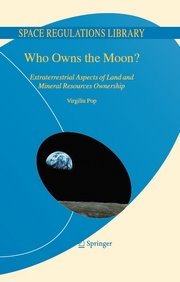
2004, February 11th. Newhouse News Service publishes "Questions of Property Rights May Bedevil Private Ventures in Space" by Margie Wylie, after interviewing me - "But even if simply asserting ownership could make the moon Hope's, he is a Johnny-come-lately. Virgiliu Pop, a space law expert and lecturer at the University of Lille 2 in Lille, France, points out that between 1950 and 1970 alone, there were at least four other moon claims"
Wednesday, February 11, 2004
Newhouse News Service: "Questions of Property Rights May Bedevil Private Ventures in Space"
Sunday, February 8, 2004
La Tercera: "Venta de terrenos en la Luna y planetas cercanos se convierte en moda comercial"

2004, February 8th. I am interviewed by Marcelo Córdova Silva, a journalist for the Chilean daily La Tercera. His article - "Venta de terrenos en la Luna y planetas cercanos se convierte en moda comercial" speaks about -
"Virgiliu Pop, investigador de la U. de Glasgow (Escocia) y del Instituto Internacional de Ley Espacial, dijo a La Tercera que lo único que se obtiene de gente como Hope es un trozo de papel que no da derechos de posesión. "Aunque la ley reconociera la propiedad privada en el espacio, Hope no sería dueño de la Luna. El sólo afirmó que la poseía, tal como alguien dice que es Dios o el Rey del Mundo", explica. Incluso, en 2001 Pop inscribió el Sol a su nombre en el Instituto de Registros Arquímedes para "mostrar cuán ridículo es decir que es mío porque yo lo digo. Si alguien dice que la Luna es suya, creo que debería pagarme por la luz que recibe de mi propiedad"."
Monday, February 2, 2004
Amcgltd.com: "How About Some Cheese Instead? "
Scott at amcgltd.com (http://www.amcgltd.com/archives/2004_02.html) writes:
"Space.com is carrying this detailed report on a business you probably don't know exists yet is amazingly profitable... selling lunar real-estate:
Every day hundreds of people fork over about $30 for 1-acre slices of the Moon and Mars. (Prices are going up: For roughly the same amount, prior to 2001, you could get 17,700 acres.) The cost includes shipping and handling of a deed, a map, and the lunar or Martian "Constitution and Bill of Rights," all printed on simulated parchment.
A lot of leftist back-and-forth about whether or not someone can sell chunks of something when there's nobody to actually buy it from in the first place. I particularly liked the blatherings of one Virgiliu Pop, a British legal scholar:
One precedent Pop draws on involves the Masai tribe in Africa, which "has a similar legal claim over all the cows in the world, yet in reality, people all over the world continue to buy and sell cattle without involving the Masai. What I dispute here is the 'it is mine because I say so' approach."
If the Masai were in charge of, say, the same resources as Germany we would take their claims far more seriously, probably devoting a whole section of the UN's world court to debate the matter endlessly while diplomats parked on the sidewalks of Manhattan and sent their daughters to Bloomingdale’s. If they controlled the resources of, say, the United States, we'd all be paying a cow tax.
Ownership of the moon depends a lot on whether or not there's anything on the moon worth owning. If it's all just dust and gravel, I fully expect some sort of high-minded international agreement along the lines of what works in Antarctica. If, on the other hand, a meteor blew the top of a mountain off and revealed, say, a gold deposit the size of Brazil, I fully expect it to be settled the old fashioned way... last one to the top the hill is a Frenchman!"
Space.com: "Lunar Land Grab: Celestial Real Estate Sales Soar"

February 2nd, 2004, United States. I am interviewed by Robert Roy Britt of Space.com. His article, "Lunar Land Grab Celestial Real Estate Sales Soar" states, inter alia:
"In a crafty stunt designed to "expose the phony extraterrestrial real estate industry," British legal scholar Virgiliu Pop declared in 2001 that he owns the Sun and can charge the "owners" of other solar system bodies for the solar energy they receive. Pop has written several papers on space property rights and is a member of the IISL. "The Lunar Embassy does not own the Moon, hence it cannot sell it," Pop said in an e-mail interview. "If you still believe you can actually own the Moon by buying it from the Lunar Embassy, then you will have to pay me utilities fees for the Sun that I own as much (or as little) as Mr. Hope owns the Moon." One precedent Pop draws on involves the Masai tribe in Africa, which "has a similar legal claim over all the cows in the world, yet in reality, people all over the world continue to buy and sell cattle without involving the Masai. What I dispute here is the 'it is mine because I say so' approach." A cornerstone of Lunar Embassy's claims -- the absence of governmental protest -- is irrelevant, Pop argues, because no protest or response was to be expected "with such trivial claim" in light of accepted international law. Pop further contends that Dennis Hope's quest, which began in 1980, came too late. "A lunar claim was lodged in Chile back in 1953," Pop says, "and a Declaration of Lunar Ownership was issued by the city of Geneva, Ohio, back in 1966."
So why don't governments put a stop to all this? "Perhaps -- and this is my opinion, not the government’s -- this is because the government is concerned right now with more important issues," Pop said. "Yet, I hope one day the government will pay attention to the Lunar Embassy’s antics."
Robert Roy Britt's article appears also on MSNBC under the title "Could lunar real estate spark a future war?"





